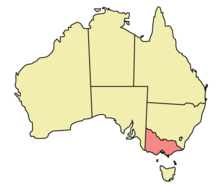LGBT rights in Victoria
| LGBT rights in Victoria | |
|---|---|

|
|
| Same-sex sexual activity legal? | Always legal for women; legal for men since 1981 |
| Gender identity/expression | Still requires sexual reassignment surgery (SRS) for a new birth certificate |
| Discrimination protections | Yes (both state and federal law) |
| Family rights | |
| Recognition of relationships |
Domestic partnership registries since 2008 |
|
Restrictions:
|
Same-sex marriage prohibited under federal law since 2004; see History of same-sex marriage in Australia |
| Adoption | Yes |
The Australian state of Victoria is regarded as one of the most progressive jurisdictions with respect to the rights of lesbian, gay, bisexual, transgender and intersex (LGBTI) people. LGBT people in Victoria have many of the same rights as non-LGBT people, though same-sex couples are banned from entering into civil marriage, which is a field of federal jurisdiction.
Homosexuality was a crime in Victoria until December 1980, when the Hamer Liberal government repealed the state's sodomy laws. (Until 1949, the death penalty was still on the books for sodomy in Victoria.) The law passed 72–7, and went into effect in March 1981. The age of consent for homosexual acts was set at 18. However, a loosely worded "soliciting for immoral purposes" clause, inserted by dissident Liberals, saw police continue to harass homosexual men well into the 1980s.
Gay activism in Australia began in Victoria, particularly in Melbourne. The Melbourne-based Daughters of Bilitis (Australia), which was inspired by the American Daughters of Bilitis group, was Australia's first openly homosexual political organisation, although it was short-lived. It was followed by the gay rights organisation Society Five, which formed in 1971. Additional rights organisations followed, including the Homosexual Law Reform Coalition in 1975 and the Gay Teachers Group in the late 1970s, both of which were also based in Melbourne.
The Victorian LGBT community monitored events in South Australia surrounding the decriminalisation of homosexuality which took place between 1972 and 1975. In 1976, The Age reported that police had used entrapment to make mass arrests at Victoria's Black Rock Beach which angered the gay community and gave the issue wide public attention. Amidst the storm of protest and debate, widespread support for the decriminalisation of male homosexual acts surfaced within the political mainstream.
...
Wikipedia
